

GROWING NEW ZEALAND

In this issue, we delve into the fascinating world of New Zealand's olive growers and their commitment to crafting premium olive oil. We had the privilege of speaking with dedicated olive growers from across the country to gain valuable insights into this unique segment of the horticulture industry.

Creating New Zealand-made olive oil is an art form in itself. Each grower invests excellent care and attention into cultivating, harvesting, and pruning various olive tree types, resulting in olives that boast an array of delightful flavour profiles, catering to diverse


consumer preferences. However, like many other industries, this speciality practice has not been immune to the impact of recent and ongoing extreme weather events.











As the harvest season has closed for this year, we reflect on the challenges that olive growers face due to the wet summer, which has significantly affected the olive yield and flavour potency. Olives typically thrive and develop a higher intensity of flavour in warmer temperatures, making weather conditions a crucial factor in production.




Despite these hurdles, the

resilience and dedication of our industry growers shine through as they continue to work tirelessly to create olive products that stand proudly amongst the best in the world. The olive oil from this most recent season will undoubtedly reflect the trials and triumphs the growers face, a testament to their unwavering commitment to excellence.

Join us as we celebrate the artistry and passion behind New Zealand's olive oil industry and explore the stories of those who have dedicated themselves to producing the finest olive products for consumers worldwide.



New Zealand
Follow along as we discover new products and innovations across New Zealand.
For over a decade the New Zealand Artisan Awards has provided a platform for emerging and established artisan producers to showcase
Entries Open Entries Delivery Dates

24 May - 22 August Entries Open
23 August Ambient

30 August Frozen
6 September Fresh/Chilled
21 September Bronze, Silver & Gold Awards Announced










19 October
2023 Supreme Winner Announced
SOLVING TEXTURE AND TASTE CHALLENGES OF PLANT-BASED ALTERNATIVES
ABF ingredients company and its brand, Ohly, offer a range of yeast-based vegan flavour solutions that deliver authentic taste and texture for various alternative protein products.

Demand for plantbased alternatives has increased significantly over recent years, primarily motivated by the conscious consumer concern about the environmental impact of traditional meat manufacturing and production, coupled with a growing concern regarding animal welfare and personal health.
This has made vegan, vegetarian, and flexitarian lifestyles increasingly popular.
This new innovative food technology solution caters to the increasing global demand from consumers for plant-based options that can deliver on the flavour and texture profiles of traditional meats, which they love, which has been challenging for the industry to solve.
According to market research expert Innova, consumers seek natural, healthy alternatives with authentic taste and mouthfeel. Consumers ask for natural, healthy alternatives with an authentic taste and mouthfeel, and Ohly has created a solution that could cater to these consumer demands.
Read more here
The BusinessNZ Energy Council (BEC) has outlined core competencies and areas of concern for the energy sector as part of its 2023 election briefing document, launched today.

Executive Director Tina Schirr said the briefing highlighted key issues as identified by the energy sector, which the Government cannot ignore.
"Critical areas of concern include simplifying the Resource Management
Act to ensure it is fit-forpurpose, looking at how to boost investment in energy and attract talent to New Zealand, and how to restore confidence in our carbon market and the Emissions Trading Scheme,” said Schirr.
Schirr continued that these areas were nonnegotiable if New Zealand is serious about meeting its carbon emission reduction goals in 2030 and beyond. Read more here
3D PRINTING TECHNOLOGY FOR FOOD TO SCALE-UP
Steakholder Foods Ltd, an international deep-tech food company at the forefront of the cultivated meat industry, announced that it has entered into a Memorandum of Agreement for Strategic Cooperation (MOA) with
an accredited GCC-based governmental body as Steakholder Foods' strategic partner to advance food security efforts through the application of Steakholder Foods' groundbreaking 3D printing technology.
THE BUSINESS NEW ZEALAND ENERGY COUNCIL OUTLINES AREAS OF CONCERN
Commencing with an investment by the strategic partner in constructing a pilot plant to produce printed hybrid-fish products, the MOA eventually aims to create a first-of-its-kind large-scale production facility in the Persian Gulf region. The agreement foresees a material initial down payment to Stakeholder Foods to procure its 3D-printer technologies, followed by a milestone-based sales and procurement plan for industrial-scale output.
The MOA intends to contribute to the scalability of Stakeholder Foods'
3D-printed food technology in the Gulf Cooperation Council ("GCC") territories, representing the economic union between Bahrain, Kuwait, Oman, Qatar, Saudi Arabia, and the United Arab Emirates.
The collaboration between the partners will leverage Steakholder Foods' expertise in providing mature Ready-to-Cook (RTC) 3D printer technologies and customised bio-inks, tailored to produce a wide range of species-specific cultivated fish and meat products, as well as vegetable-based products.
Read more here

INDOOR FARMING BUSINESS LOOKING TO RAISE NEW CAPITAL

26 Seasons, a company specialising in off-season premium strawberry production through its Controlled Environment Agriculture (CEA) indoor farm, is seeking to raise $1.5 million in new capital (with the ability to take up to a further $3m in oversubscriptions) through online investment platform, Snowball Effect.
Supplier A-Z

This will complete its Series A funding round, adding to the $3.55 million (made up of $1.55m equity and $2m debt from the regional economic development and investment unit, Kānoa) the local agritech company has already secured as part of this round. Read more here
THE RISE OF PACKAGING AUTOMATION

According to Future Market Insights, the global packaging automation market will experience significant growth over the next decade.
The packaging automation market currently holds a value of USD 74.53 billion in 2023, and it is expected to register a compound annual growth rate of 8.05 percent over the forecast period, By 2033, the demand

over this forecast period will have driven the value of the Packaging Automation market to reach a value projected at USD 161.66 Billion.
This value increase can be attributed to the market's broad reach and automation increase across multiple sectors, including food and beverage, pharmaceuticals, and personal care.
Read more here

ADVANCING THE FOOD SCIENCE SYSTEM
The Institute of Food Technologists (IFT), a nonprofit scientific organisation committed to advancing the science of food and its application across the global food system, has launched two product development platforms that address the challenges, resource shortages, and learning gaps that exist in the product development process in the food and beverage industry.

The Product Development
Bootcamp is designed to equip product developers with the skills and knowledge to overcome challenges and bring products to market more efficiently. At the same time, Concierge Service supports food and beverage professionals who might be lacking the bandwidth to conduct critical research and other time-intensive activities necessary in the product development process.
Read more here
TEAMING UP FOR BIOLOGICAL SOLUTIONS
Corteva Agriscience and Bioceres Crop Solutions Corp announced that they have entered into an exclusive agreement to advance the availability of biological solutions in Europe.
Under the agreement, Corteva Agriscience and Bioceres Crop Solutions will work jointly to accelerate the regulatory processes required to bring a cutting-edge bioinsecticide developed by Bioceres’ subsidiary Pro Farm to the European market.
The product is an
PROMOTING REGENARATIVE FARMING
ADM, a global leader in sustainable agriculture supply chains, is launching a significant expansion of its re:generations regenerative agriculture program, ensuring more North American producers can earn additional income while positively impacting the environment and their soil’s health.
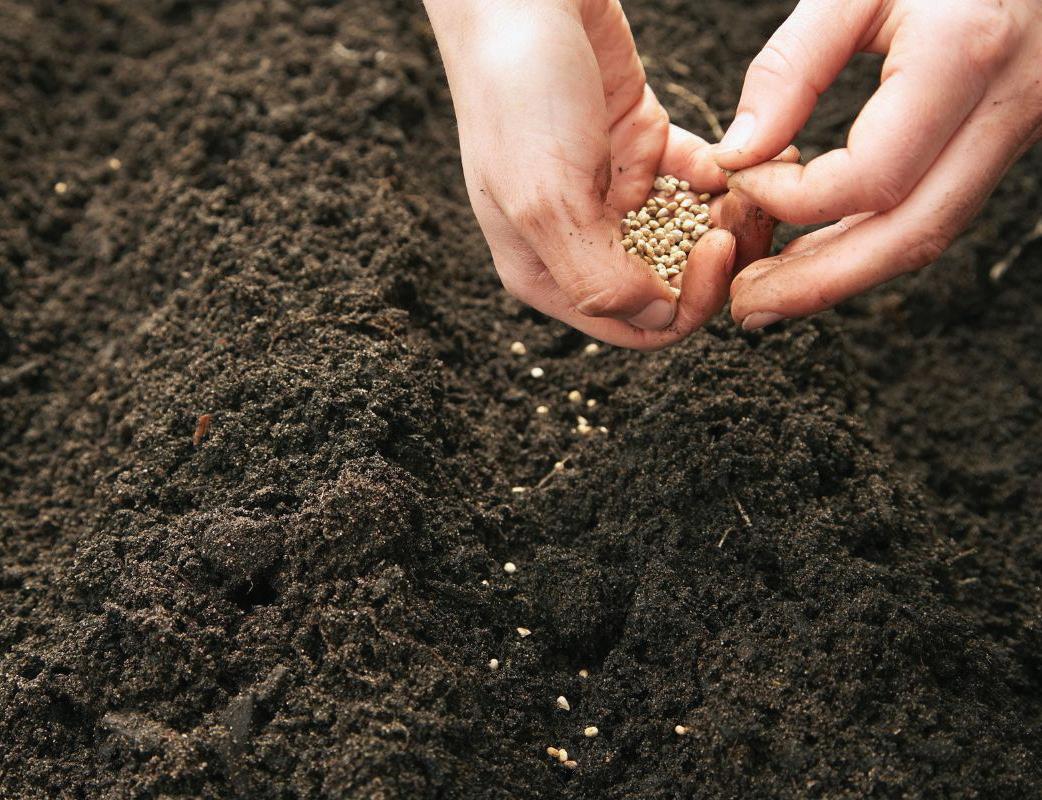
After successfully enrolling more than one million acres in 2022, ADM continues investing in expanding re:generations to cover two million acres in 2023. It is reaching a goal of four million acres globally by 2025.

“With a value chain that stretches from more than 200,000 producers to downstream customers spanning food, feed, fuel, industrial and consumer products, ADM has an unparalleled ability to scale regenerative agriculture practices around the globe,” said Paul Scheetz, director of Climate Smart Ag Origination at ADM.
“We’re proud of our groundbreaking work to support regenerative agriculture efforts, which was recognised with a grant from the USA Department of Agriculture through which we’ll direct more funding

directly to producers.”
Scheetz knows producers have always been stewards of the land and that this is their lifeblood, which is why ADM is excited
extremely viable biological insecticide that can be as effective as conventional insecticides and is a good fit for mainstream agriculture, with target crops including corn and other cereals and sunflower and rape seeds.
Once registrations are secured, Corteva Agriscience will be the exclusive distributor in Europe through their Seed Applied Technologies team. It will also treat its Pioneer brand seed products with the technology.
Read more here
to continue to invest in expanding its unique array of re:generations of benefits to bring even more of them into the program.
Read more here
Evolving your business for the sustainable future















To be a successful business in the 21st century you must understand and embed sustainability into your organisation. With increasing extreme weather events, legislation changes, and consumer pressure, climate action and sustainability have become mission critical for business success.
People make choices on what to eat and drink every day, and for most their diet will be their biggest environmental impact. In addition, diet related choices have a massive impact on the health and wellbeing of our communities. Because of this, Food and Beverage businesses have a special opportunity and increased level of responsibility to build the sustainable future.
Go Well Consulting supports businesses understand and face up to the environmental, social, and economic challenges we are dealing with globally, locally, and within industry, and then identify and implement the opportunities to be part of the transformational change we require to achieve a sustainable future.
Go Well take a whole of economy approach and works with multiple different industries. Within F+B our clients include Pals, Otis Oat Milk, Burger Fuel, Ripe Deli, Kokako Coffee, and Peoples Coffee. We have supported these businesses with a range of our services including the development and implementation of sustainability strategies, writing sustainability reports, stakeholder engagement, measuring impact, communicating sustainability with confidence, developing strong cultures of sustainability, mapping and reducing their carbon footprint, reducing their waste and improving their packaging and management of materials.
With more than five years' experience working with both New Zealand and Australian businesses we have a proven track record of helping businesses succeed by doing things differently.
Get in touch with us for a free consultation and find out more on how we can support you to achieve a sustainable future. Businesses we’ve worked with:

"SALUTE"... HERE'S TO GOOD HEALTH
Like many other countries, New Zealand feels the effects of a cost-of-living crisis. Rocketing food, energy and property prices are hitting consumers' wallets, causing changes in spending behaviour.
As a result, many consumers are looking to save money by eating and drinking at home. This has led to an increase in Craft Alcohol. New Zealand drinkers have been drawn towards craft products thanks to the broader trend towards moderation, leading consumers to prize quality over quantity. Consumers are also becoming more aware of locally owned vs. big corporate brands resulting in location and regionality starting to play critical factors in purchase decisions.
The future of the beverage category is functional health. Consumers increasingly seek a health benefit from anything they consume, whether a functional claim or a health halo effect. Functional health claims can further improve the permissibility of beverages.
Brands can use beverages to deliver functional health benefits to help improve immunity, enhance relaxation, improve focus, and support an active lifestyle. Botanicals add an authentic taste to products, associating health benefits and an added health halo effect. Experts note that adaptogens, utilised in Ayurvedic and Chinese medicine for more than 1,000 years, are growing in popularity globally in the functional beverage space. Some common botanicals and adaptogens include turmeric, ginger, lions mane, passionflower, green tea, green coffee, aloe vera, guarana, saffron, amla, Rhodiola, basil, nata de coco, and yerbamate. Meanwhile, functional and health claims, for example, vitamin or mineral fortified, remain niche but are gaining share.
Low or no alcoholic beverages are also on the rise. A study has recently reported that 'younger and middle-aged beer drinkers (18-44) in the United Kingdom tend to favour low-alcohol over no-alcohol options, while low and no-alcohol options are equally popular among those aged 45 and over.
The industry is also tackling concerns around sugar with increasing launches using claims such as sugar-free, no added sugar or reduced sugar. New Zealand has yet to follow the lead of other
nations with a sugar tax. One of the primary drivers of alcohol choice by Millennials, who hold the largest share (62 percent) of RTD purchases, is flavour. Yet many Millennials think alcoholic RTDs are excessively sweet, with more than 30 percent of Millennial alcohol drinkers reporting they often avoid alcoholic RTDs because they are too high in sugar.

Floral and botanical flavours like Bush Honey, Hibiscus, Lavender, and Cherry Blossom, offer the health halo effect. Bold, juicy fruits like Yuzu, finger lime, calamansi and tangelo are trending amongst consumers in 2023. Classic sweet flavours are no longer favoured. Consumers are wanting to pair sweet flavours with savoury and salt. Think Margaritas.
Sherratt's offers quality flavours produced by Essential Flavours. For anyone needing to quench their thirst for future beverage flavours, contact Sherratt Ingredients, technical experts and applications facilities to support your new development.

THE BENEFITS OF EXTENDING SHELF LIFE
In the era of sustainability, rising ingredient and energy prices, and climate-driven food poverty, reducing waste by extending shelf life is more imperative than ever.

To address these multifaceted pressures, Campden BRI has launched a new e-book, Maximising Shelf Life, in which its experts share valuable insights on how the combination of packaging and processes needs to be optimised to reduce waste and increase the shelf life while maintaining consumer confidence without compromising product safety or quality.
Studies by climate-action NGO WRAP from the last decade suggested that approximately 50 percent
of consumer food waste can be prevented simply by extending the shelf life of products. The World Health Organisation puts this into context. Global reversal of food waste could save enough spoiled food to feed two billion people worldwide.
Microbial profiling, superchilling, heat pasteurisation and modified atmosphere packaging are just a few of the preservation techniques that food and beverage processors can adopt. Yet, with so many different quality, waste, sensory, taste and production factors to consider, uncovering the best and most sustainable option to extend the shelf life of individual fresh, frozen, ambient and bottled brands
can feel like an endurance test.

Given the volume of interconnecting factors, Campden BRI's Maximising Shelf Life e-book explains step-by-step the approach food and beverage processors need to consider for any shelf-life extension project, including how its

scientific processing and packaging experts can assist with uncovering, validating, reviewing, proving and implementing a shelf life strategy aligned to individual product applications that meet HACCP and country-specific food safety legislation.

Read more here

MATTHEW KELTIE 26 Seasons
Matthew Keltie, co-founder of 26 Seasons, used to work as a corporate farmer based in Wellington. One day, Keltie was reading the paper when he saw a story about a vertical garden that could grow up against the wall in an office, out the back of the home, or wherever a person could want. This concept resonated with Keltie.
"Food production in New Zealand is a bit further than posted wires and battens and, and lands, and we have to think out a bit further outside of square about how we produce food going forward," said Keltie.
Along with his co-founder, Keltie set up a similar gardening system in a garage. Later, the pair tried the concept at a small town site and built a prototype system where they could supply a few local restaurants, enabling them to create a proof of concept.
Keltie began with leafy and micro greens, then leapt into growing strawberries, which he described as a nice challenge. The pair grew 1000 plants the first year around. He admitted doing everything wrong last year at 26 Seasons' current site in Foxton. However, it has grown 8000 to 14000 plants this year, with 50,000 plants total.
The choice to grow strawberries was strategic, with leafy greens being a popular product to grow both within a vertical farming environment and through traditional farming methods,


creating a competitive market where many are trying to sell the same product to restaurants, supermarkets, and customers. Strawberries were a product with a high-demand market with lower supply, given their seasonality. Offering the seasonal berry to New Zealanders year-round to avoid relying on imports was an excellent opportunity for Keltie and his co-founder to work on providing a solution.
"What we're aiming for is the route of season market so that we want New Zealanders to have access to fresh and high-quality strawberries during the middle of winter instead of them, you know, as an option to the fruit that comes in from a from Australia that's flying over."
Keltie continued that making the berry readily available would also reduce the carbon footprint of imports and ensure quality.
Much of what Keltie does through the controlled environment agriculture method of farming naturally falls into mitigating the environmental footprint of farming.
Having spent quite a bit of time dealing with dairy farmers and sheep farms and dealing with fertiliser, Keltie explained that through the
alternative farming method, the systems are selfcontained, so there are fewer chances of waste, as they are climate controlled and therefore not at the mercy of wind affecting the spread of fertiliser, or with soil experiencing nutrient loss and sediment flows as a result of the weather and outdoor environment. The most significant carbon footprint of controlled environment agriculture is energy use. Keltie said this footprint could be mitigated using renewable resources, including solar panels and light timers, so electricity is used at off-peak times.
Strawberries are the central focus of 26 Seasons. Keltie is determined to get this right, as perfecting this and being a financially viable business is imperative. The company is building a laboratory allowing Keltie to perform quick iterations to achieve this. The focus will be to ensure that different aspects of the primary growth system can be tested to ensure their methods are correct. Only after this has been achieved would Keltie consider growing other berry types.
New Zealand's traditional farming methods are not something that will be replaced by controlled environment agriculture, with Keltie stating that the central production system in New Zealand would continue to be on the land, with apple trees grown in the outdoor soil, under the elements, demonstrating the strength of New Zealand's natural capital of generally good soil and climate.
However, Keltie continued that when evaluating recent global events, extreme weather, and food insecurity, New Zealand's position is incredibly isolated compared to continents such as Europe, where a supply system spanning numerous countries is easy and accessible.
"So now when we look at COVID, even the effects of the Ukraine situation, there'll be a little bit of a reliance on us being able to look after ourselves domestically. So there may be an option there for vertical farming. Or indoor farming or controlled environment agriculture."
Keltie said there were many solutions New Zealand would have to find to complex, ongoing, and arising issues where there is no simple fix or solution.
Given these thoughts, Keltie added that 26 Seasons was not looking to export its strawberries as it defeats the purpose of the business philosophy. Instead, once Keltie has customised components of its controlled environment agriculture growing, the systems Keltie creates and uses would be shared globally and available to be set up offshore.
26 Seasons has already connected with potential clients in Asia and the Gulf States who have shared interest in these farming solutions. These solutions will be a collaborative effort. Keltie said they are trying to take as many New Zealand companies along with 26 Seasons, as many components and technology from others will need to be brought together to create this farming solution.
"We would like to be able to make it a valuable exercise for ourselves and our partners."


On the day-to-day, Keltie spends part of his week at the Foxton, where he praised the team's work and said that watching the site's growth was one of the most satisfying aspects of his work, as well as watching his team's enjoyment in growing strawberries, with 26 Seasons' philosophy revolving around learning fast and failing fast. This philosophy was built on keeping expenditures low and creating a simple solution for a complex problem.
"We've got some brilliant people with science backgrounds, and, you know, we're a nation of farmers anyway. So, we work hard at understanding cause and consequence, which is about under, you know, diagnosing the bottlenecks and the failures and looking for improvements in the business."
Day one for 26 Seasons was challenging for the business, with some steep learnings.
However, Keltie said the team had brought it together in the last two years. The odd silly mistake is still made, meaning the team has to go back and rebuild certain aspects of the systems, but the impact has come along leaps and bounds.
The best season that the company has had is its current one, with this being year three of the business's history, Keltie explained that they would continue to learn about controlled environment agriculture for the next 20 to 50 years.
For years to come, Keltie wants 26 Seasons to be a profitable company with a brand centred on its values, where people enjoy coming to and working.
"We want to be seen as a provider of high quality and fresh, fresh strawberries at this stage and then a company that's seen as a valuable partner to our partners that allows us to collectively grow and go offshore and be proud New Zealand business."


LANDLOGIC ALAN COTTINGTON
Landlogic was inspired by the ambition to lead cutting-edge, emerging technologies, supplying solutions to New Zealand's primary industries. CEO Alan Cottington said that vertical farming systems (VFS) are one of those technologies with the potential to shape the future of farming globally and help feed the world as the industry faces new and more complex challenges.
Landlogic will be setting up a VFS project in Ashburton, a smallscale trial with the potential for large-scale impact on the region.
"From a growing standpoint, VFS creates an ability for growers to adopt vertical farming technology to diversify their business, manage seasonality, and minimise the impact of weather events," said Cottington.


VFS uses minimal land area for the volume of food it can produce, meaning that land use can be maximised by using this technology to grow leafy green, freeing up productive land for growing other produce and subsequently increasing growers' production capabilities. Cottington continued that there was also an opportunity to specialise in growing out-ofseason produce for the region, reducing New Zealand's reliance on imports and associated higher costs for the end user.
ALAN COTTINGTON Landlogic CEO"The Ashburton district is
New Zealand's largest supplier to the seed industry, with a strong reputation globally. There is now an opportunity to develop seed specifically for the global Vertical Farming industry."
This VFS project will demonstrate the benefits of vertical farming for New Zealand and showcase the technology the system provides potential growers and customers. Cottington hopes the system would give New Zealand and the Pacific confidence to invest in this technology to build sustainable food security.
As a starting point, the Ashburton project will grow a range of leafy green produce, such as lettuce and baby spinach.
Key benefits of the VFS technology include its reduced water consumption, with the system 99 percent more efficient, and it can even be water positive in a humid climate. It requires no chemicals such as herbicides, pesticides, or fungicides and zero human handling of the product.
There is also up to 40 percent extra shelf-life of the product, significantly less use of the land area to produce an equal volume of product, accessibility to locally-grown produce year-round, and it also increases resilience to extreme weather, reducing risk.
The strategic position of VFS farms reduces transportation, therefore less cost, handling, and reduced risk of road network outages, with the added benefit of a lower carbon footprint. Produce can be grown to demand, with a 28-day growth cycle, consistent yields and quality, meaning consumer and industry needs can be consistently met.
Finally, the system also creates less food wastage, with New Zealand currently having 3.8 million tonnes of food waste yearly, costing approximately 458 million NZD.
"Not only is this a massive cost to the taxpayer, but it is also a significant waste of nutrition."
Landlogic is the first New Zealand company to supply automated VFS to the country, but it takes much more than just the right equipment to make this successful. Cottington said the company planned to provide New Zealand serviced and supported equipment to the industry along with a network of third-party suppliers providing a system that can grow sustainably and profitably.
"We want to partner with local businesses and talent, to create a successful supply chain and job opportunities for Kiwi talent worldwide."
Cottington continued that there was no doubt climate change was happening and accelerating, with agriculture having a significant part to play globally in climate change. However, the agriculture industry has many solutions to slow and reverse the impacts of climate change.
"In New Zealand, we farm better than anywhere in the world, but there are always opportunities to improve. Using technologies such as vertical farming and regenerative agriculture are two key opportunities."
He explained that significant events in New Zealand during the past couple of years have impacted produce growth, including recent and ongoing floods devastating horticulture in the Hawkes Bay and Gisborne area, along with impacts to the roading network out of Gisborne (further impacting the supply chain), through to hail storms in Tasman and drought conditions in Auckland.
Vertical farming addresses these issues by moving the entire farm indoors, with a controlled climate for plants to grow with the right temperature, humidity, airflow, and even the option for CO2.
"We use very little water in comparison with traditional farming, our Bioponics nutrient system is a closed loop, so it is recirculated, and we even have a transpiration recovery system in our cells. This makes Vertical Farming resilient to climate change and weather events."
Suited best to fast-growing leafy produce such as salad greens, herbs, and microgreens, VFS is being utilised by other companies to develop systems for specialty crops, such as 26 Seasons with strawberries and Fischer Farms in the United Kingdom, even testing crops such as wheat.

Cottington said it took only time and imagination to develop suitable systems. However, while VFS can be adapted to grow many plants, the key is for it to be economically viable, which is why Landlogic focuses on leafy greens.
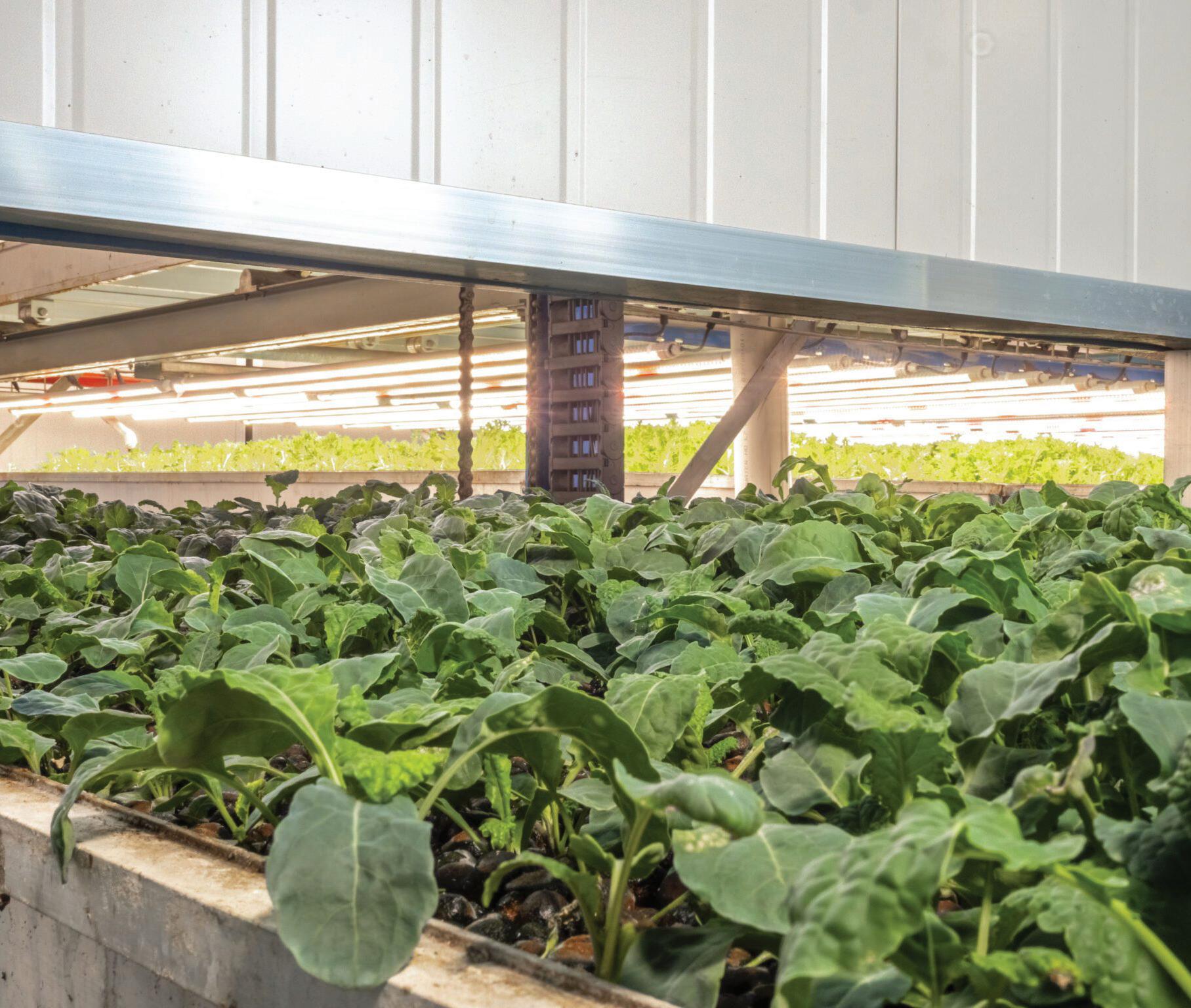
Landlogic's systems are a modular design with four different size climate cells that can run up to seven cells on each production line. It can plant and grow to consumer demand and adjust to market demand quickly due to the short growing cycle.
Furthermore, Landlogic systems can grow multiple varieties within the same climate cell to give growers ultimate flexibility to meet their customers' volume needs while providing options on how produce is delivered to the market. The systems can be scaled from 119kgs per week to whatever the business or country needs.
"I can't yet claim there is any unique produce that this would allow us to grow in New Zealand that we could not otherwise grow without doing more research, but some types of herbs, seedlings or produce such as saffron have potential."
He added that there was produce such as root vegetables much better suited to traditional farming at this stage, particularly financially, so he suggested that VFS was an excellent solution to freeing up valuable farmland for these products.
Cottington explained that VFS was one tool in the toolbox of feeding the world, designed to work alongside and complement traditional farming in a new and exciting way. Like the rest of the world, New Zealand is challenged to feed a growing global population on less available land.
"I was astounded at the figures in New Zealand of how much available farmland has decreased during the last 20 years."

This challenge of feeding a growing population has been faced through high-intensity farming and the introduction of synthetic fertilisers and sprays. However, that has created new challenges and negative impacts for the industry.
In New Zealand, Cottington said he felt there was a need to adopt new technology to complement traditional farming practices while looking at ways of continuously improving or refining traditional practices, moving away from the use of synthetics, as this will be expected of the industry.
VFS implementation in New Zealand would benefit from government investment in sustainable energy growth and reduced power costs.

olivespotlight
Crafting and growing premium New Zealand-made olive oil is a speciality practice wherein each grower takes great care in growing, harvesting, and pruning varying olive tree types, each creating an olive that presents a range of flavour profiles that cater to differing consumer needs. This industry segment is one of many which has felt the impact of recent and ongoing extreme weather events. With the harvest coming to a close, the wet summer has meant that the olive yield has been impacted, with the potency of flavour affected, as olives tend to thrive and have a higher intensity of flavour with heat.
Therefore, olive oil produced from this most recent season is bound to reflect the challenges and triumphs of the recent seasons, with industry growers working hard to continue to develop olive products that place amongst the best in the world.

ROSS VINTINER
round a decade ago, Vintiner returned to the Wairarapa to rejuvenate an olive grove in Martinborough.

"I have always loved growing plants, especially trees, and I adore everything olives," said Vintiner.

Vintiner was a consultant in Wellington for many years. He then studied for a diploma in organic agriculture before purchasing his current grove, committing himself to evidencebased innovations and methods to grow great olives and oil.
Dali has 1100 trees using biodynamic and organic methods, consisting of Tuscan varieties Leccina, Frantoio, Pendolino, Greek varieties Koroneiki, Kalamata, and Spanish variety Picual.
Dali farms with a negative carbon footprint increasingly provide nutrients and other inputs from their diverse property. Vintiner said that principally he farms olives for their
We had the opportunity to speak with Olive growers across the country to gain insight into this unique segment of the horticulture industry.
Director, grove manager, olive oil maker and marker of Dali, Ross Vintiner established his first trial olive grove in the Wairarapa in the late 1980s, which he later sold to concentrate on his Wellington business.
polyphenols, which he has coined nature's antioxidants, as these provide most of the health benefits in olives.
World-leading agronomists agree that living soil and fostering strong microbial interrelationships with plants are essential to thriving agriculture. Which Vintiner said was consistent with biodynamics and the best of organics.
"Our soil is alive, as all soil should be. We always apply microbes with any organic fertilisers, and we are lessening our use of fertilisers and increasing use of home-made fungal compost, vermicasts, and sheep grazing."
Dali regularly measures the soil for microbes, nutrients, and plant sugars. Vintiner added that each grove was distinct and that Dali's growing methods were proven sustainable, economic, local, and prosperous and could be widely applied with a sensible transition plan.
The local terroir impacts
Vintiner's grove, meaning hot and dry summers and cold winters, with moderately fertile soils, good sunshine hours, and lush growth. For the last 18 months, the region
has had double the amount of its average rainfall, coupled with low sunshine hours. This has resulted in strong vegetative growth with variable fruit sets and crops.
Vintiner said the Tuscan varieties coped better than the Greek or Spanish varieties—these varieties, like the terroir, favour dryer, more stable conditions. Vintiner's growing approach was explicitly designed to increase resilience to climate variability.
Day-to-day varies greatly for Vintiner, with the season having the most significant impact on variation.
Dali has just completed handharvesting. The trees and soil are now fed microbial food for winter.
"It's time to coppice, chip our Italian Alders, and make copious amounts of beautiful fungaldominant compost. Then lambing and pruning."
Dali's best award was for being in the top 25 olive growers in the world for the production of top-quality olive oil and table olives. The global award, Best Luxury Olive Oils of the World, recognised Dali's growing method, innovation, fruit and soil quality,

as well as its leadership in the polyphenol space and Dali's marketing.
Vintiner said that most olive awards focus on oil flavour. To Vintiner, this only partly defines quality.

"Olive oil is as much about health as it is about flavour."
He continued that the past two years had been highly challenging due to the weather. Copious rain and lack of sunshine hinder excellent olive oil, which is rich in antioxidants and flavour. Dali has persevered, Vintiner stating that its soil and trees are in great shape.
Dali grows Wairarapa's only commercial Kalamata table olives; the trees grow well in the region but do not always yield fruit, yet Dali has Kalamata olives each year. Vintiner said this was because the trees were planted with the benefit of added microbes, and comfrey grows underneath, providing a rich microbial environment with nutrients supplied. The grove also has a half-hectare indigenous wetland. He added that Dali has 100 Italian Alders planted within
the grove, and there is a mixed sward of clovers, plantain, and other plants to support grove diversity.
Dali oils and olives are mainly sold in the Wellington region. However, they are also sold nationwide and supplied to the global wellness industry.

Vintiner stated that Dali was a leading innovator, pioneering a harvest timing method that measures plant sugars to determine harvest date and likely polyphenol level for each variety. Another important innovation was fermenting olive pressing 'waste' or pomace, producing a high nitrogen and potassium mix for olives. Dali has developed a successful fungal ground drench with biodynamic preparations, Italian Alder compost, and vermicasts.
Dali has several other innovations under trial currently also.
Vintiner's favourite variety is Kalamata, with it being the first to ripen and being hand-picked, which often is a family affair.

CHRIS & STEVEN PRICE
River Grove
Chris and Steven Price, the owners and growers of River Grove Olives, said that the pair owned roughly 40 hectares of land beside the Ruamahanga River, north of Masterton in the Wairarapa. The bulk of the land is leased for grazing beef, with around 13 hectares planted in olive trees ranging in age from five to 23 years old.
"Up until 2004, we were involved in the construction industry in Wellington. We had decided to look into the possibility of sending our son to Rathkeale College in Masterton, and during that process, our property came onto the market," said Chris.
The pair decided to look at the property; the rest is history. At the time of purchase, there were just under 2000 trees in the ground, all planted in 2000. The couple arrived in time for the first harvest and have been learning ever since.
The majority of the tree are of two varieties, Frantoio and Leccino. However, the pair have plantings of various sizes with a further 17 varieties.
Chris explained that each variety has unique characteristics and tastes, and the pair work closely with the olives to find out which grows best in their area's specific conditions. Being on the bank of the Ruamahanga River, the soil from which River Grove's olive trees grow is a mixture of gravel, clays, and river loam.
"They are young soils and very fertile, so our oils reflect this as they are milder."
Weather in the late summer and autumn also affect flavours, with Chris adding that the pair hoped there would be a return of a typical Wairarapa summer this year after three years of La Nina weather patterns.

"We aim to produce first-class,
high-yielding fruit from healthy, 'happy' trees."
Chris said that Steven was the grower, as this is where his passion lies. Both aim to have healthy olive trees, which Chris described as beautiful trees and living surrounded by them as the couple does, they care about them very much.
New Zealand's growing conditions for olives differ from Europe, with Olives New Zealand and the Ministry of Primary Industries invested in researching specific growing practices over the last eight years, which the Price's follow closely, the rewards of which have led to the pair doubling their crop for the last seven to eight years, averaging 20kg of fruit per tree year on year.

Day to day, Chris said there was always something to do, whether monitoring the weather or improving the farm and grove.
"Our days are governed by the seasons and the weather."

River Grove has just finished harvesting, so the business is back into the rhythm of spraying and pruning until early December when the trees flower again, then irrigation and monitoring the trees until the next harvest.
The early years, when the trees were young, were some of River Grove's most challenging harvests as the trees had to be hand-harvested, which is incredibly difficult and physically taxing labour, which was often conducted in the wet due to harvest typically coinciding with colder, wetter months like June.
The trees in production now at River Grove are all mechanically harvested with a tractor tree shaker. However, according to Chris, this last season has been the most challenging, as it has been wet with weeks of no sunshine, meaning that oil yields are also low.
The difference between an El Nino cycle and La Nina weather patterns is quite marked in the Wairarapa.
"We have just had three years of La Nina, so it has been wetter over summer and warmer going into winter, challenging growing conditions for olives."

Now, moving into an El Nino pattern, Chris said there would be more hot, drying conditions, so water will be an issue, especially around February when the fruit wants to grow, with harvest potentially interrupted by more severe frosts.
"Long-term, warmer weather will be good for olives."
River Grove's land is incredibly fertile, with the olive trees thriving, which means that the oils produced are naturally milder, which Chris said was preferred by the New Zealand customer base.



The company's oil sales increased throughout the pandemic as lockdowns drove people to buy more locally and cook more frequently. Post-covid has harmed the industry, with the cost of living

and inflation have meant that people are more frequently struggling to pay for groceries, choosing items based on price point first and foremost.
Eighty percent of the fruit River Grove produces is sold to The Village Press in Hastings, which presses and markets the oil throughout New Zealand on supermarket shelves. For the rest of the fruit, the Price couple hold and press for their boutique oils, selling it locally in Masterton and to regular customers across New Zealand.
The Price's have slowly been increasing the size of the grove to make it more financially sustainable. Chris added that they had successfully achieved that by propagating another 3000 trees, increasing the grove size to 4100 trees from 2021 to 2022.
"We have also bought a tree shaker so that we do not have to depend on contract harvesters and an olive press (an ongoing project) so that we may become self-sustainable."
Chris's favourite is the Koroneiki, a Greek variety with tiny fruit, as it is easy to grow, always fruits well, and produces excellent oil.
MARGARET HANSON BLUE EARTH ESTATE
Margaret and Mike Hanson co-founded Blue Earth Estate and became winemakers and olive growers by accident. Margaret said the pair were looking for a five-acre block where they could plant native trees and enjoy their weekends alongside their respective consultancy careers.

They found the perfect piece of land. However, it was 30 acres, and the pair felt the land needed to be productive. Twenty-five years ago, the pair planted olives on a bare sheep paddock. The following year the Hanson's planted a vineyard for someone else to use, Martinborough's pioneer winemaker, Bill Brink.
The intention was that if it was a nice day and the couple were in the mood, they would help. Otherwise, the vineyard would be all for Brink.
"Unfortunately, Bill died three years later, so we had to scramble and do some fast learning. Luckily Martinborough Vineyard took us under their wing and taught us, encouraged us, commiserated when things went wrong, celebrated when things went right and bought our grapes," said Margaret.
In 2010, the Hanson's were talked into a partnership to do their wine label, The Elder Pinot. Now the wine has been brought into the Blue Earth family and has been rebranded Blue Earth Estate.
For their olive grove, the pair now have over 1,100 olive trees. The grove includes a mix of Barnea (an Israeli variety), Frantoio and Leccino (Tuscan varieties), Koroneiki (Greek) and Manzanillo (Spanish).
At Blue Earth Estate, the Hanson's specialise in extra virgin blends, with most years producing three blends. Over the years, the oils have won national and international awards. The vineyard is approximately seven acres, primarily Pinot Noir and some Pinot Gris. Quality and sustainability are the core of the Hanson couple's growing philosophy.
"We are meticulous in the care of our vineyard and olive grove. If you make wine and olive oil, it needs to be the best that this land can produce."


As the age of the trees and the vines has increased, the quality has also increased. Margaret said the pair believe owning land-owning land is a privilege and responsibility. For example, the Hanson's are passionate about using sustainable farming practices, generating their power, using electric tools, and planting native trees yearly, with the pair having also put in a pond for wildlife and conducting predator trapping.
New Zealand Olives have run a successful research project called the Focus Grove project over the years. Growing olives in New Zealand differs from growing them in other parts of the world. This project helped the Hanson's identify what works best in New Zealand.

"We have followed the practices identified in this research, and the results have proven its worth."


As a result, Blue Earth Estate's crops have increased yearly, with the trees being the healthiest they have ever been, despite having been faced with two difficult seasons. Margaret emphasised the importance of growers knowing their land.
"We are on an old stony river terrace. Varieties and practices that work here may not work in other places. Barnea loves our land. They have been pulled out in many other areas because they didn't work."
The terroir strongly influences the quality of Blue Earth Estate's products. The stony soils provide excellent drainage. The soils are not particularly fertile, which is great for growing olives and grapes, as quality wines need low production to get the intensity of flavour. Margaret stated they are on a gentle north-facing slope, which is excellent for catching the sunlight and letting the frost drain off. However, they are also exposed to the wind, both a challenge and a blessing. The wind helps keep disease low and
contributes to the flavours of the wines.
Daily tasks are heavily influenced by the time of year, with the current focus being pruning in the olive grove and planting native seedlings the Hanson's have been nurturing, which all needs to be interspersed with marketing and sales as Margaret added that there was no point in making great products if they are not sold.
Blue Earth Estate's most challenging harvests have been the last few years, primarily due to the wet weather.
"We have been lucky compared to many. We judge the success of an olive harvest on three things, quantity of fruit, the yield of oil, and quality of the oil."
The last two years with the wet, cool weather have meant that Blue Earth Estate has had disappointing oil yields, making the economics of producing olive oil much more difficult. But the crop volume has grown, and the oil quality has remained consistently high.

For grapes, it was more complicated. Two difficult seasons, 2012 and 2017, also produced
Margaret'sMargaret's favourite Pinot Noirs.
Margaret explained that climate change had a significant impact on growers in New Zealand. In the short term, the unpredictable and extreme weather events have made recent harvests and growing increasingly complex, and in the longer term, Marget said there would be challenges about what crops to grow and where. For trees and vines, this cannot be changed in a hurry.
The pandemic impacted the pair's wine sales, with Blue Earth Estate's exported wine to highend restaurants. However, home cooking became a rediscovered joy, increasing the interest in using high-quality olive oils.
Moving forward, Blue Earth Estate's goal is to continue its journey of finding ways of doing things more innovatively and sustainably and connecting with customers to share their growing journey and products.
"I am pleased we have both olives and grapes. I love making beautiful Pinot Noir, but I also love how good olive oil so easily enhances our food and health."
ANDREW & HELEN LILEY
Juno Olives
Andrew Liley co-owns Juno Olives with his wife, Helen Liley. Originally born in the UK, Liley qualified as a doctor in 1986 and trained as an anaesthetist for 20 years as a consultant at the Birmingham Children’s Hospital and in New Zealand at Starship with an interest in paediatric cardiac anaesthesia and acute pain management.
Liley had wanted for a long time to be involved in the primary industry, and in 2020, he retired early from the health system and bought Juno Olives, which was a good fit for his background in medicine of being able to grow and produce a product that had been shown to have positive health benefits.
Liley aims to produce olives sustainably, minimising fertilisers by returning the solid waste from olive oil production to the grove, improving canopy management to minimise fungal spraying, and having olives harvested and pressed by local contractors.

He continued that Juno Olives agrumato oils are flavoured using local New Zealand produce, including rosemary and some blood oranges from Liley’s garden.
“Growing olives is a carbon sink which also minimises our carbon footprint,” said Liley.
Liley follows the guidance from a project undertaken by Olives New Zealand, which innovates canopy management to improve olive yields and try to minimise biannually what is a problem with many pip fruit.
“Whilst we have not yet got rid of the tendency for some of our olive varieties to have an on and off-season, we are slowly seeing an increase in the overall volume of olives taken off the grove, and some varieties are showing more consistent olive fruit production.”
He explained that olives do not like ‘wet feet’ and Juno Olive has been fortunate to have a well-draining soil type, which Liley said had been robustly tested this year.
The harvest of 2023 has been both Liley’s best and most challenging harvest; the heavy and large amounts of rain made keeping the fungal disease in the grove under control very difficult, and yet Liley has had the biggest harvest in his grove since it was established 20 years ago.
However, the oil yield has been meagre, meaning the high fruit volume had not translated into litres for Juno Olives.
Liley added that on top of the wet weather, olives also need cold periods over winter to stimulate fruit the following year. Therefore, general warming temperatures threatens groves such as Juno Olives.
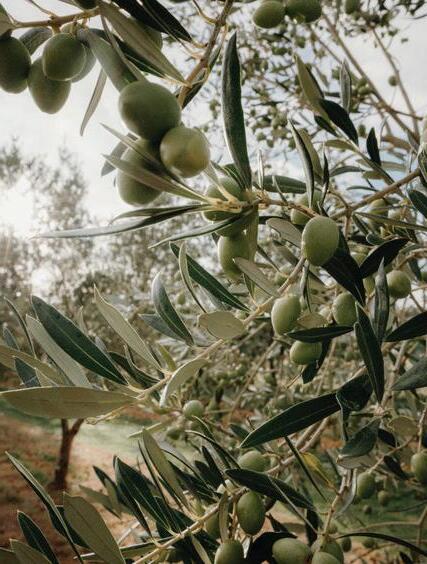

“If you look at the northern hemisphere, they have had several years of drought, and Spain has produced only half of their normal volume of olive oil.”

Juno Olives sells its oils through its online shop, the groves on-site shop, Farmers Markets, Moore Wilsons, and the Welly Collective.
Having only been in the business for three years, Liley is just beginning to understand how different varieties produce very differenttasting olive oils; he added it was that any variety would produce a different-tasting oil each year, which he assumed was due to changing weather conditions, but also by when growers are forced to harvest.
“Last year, my favourite was our Picholine, and I am favouring our Frantoio this year.”


As a relative “newbie” to the olive growing and oil-producing scene, Liley wanted to thank the many people who had helped with advice and practical support along his three-year journey.
“They are too many to name individually, but I would like to thank them all.”

olivespotlight
GRANT & DIANA CROSSE KAPITI OLIVES
Grant and Diana Crosse are the co-owners of Kapiti Olive Oil. The couple grow, maintain, and contract the harvest of trees, as well as the bottling and labelling. All the oil is distributed to wholesale and retail clients and all associated administrations.

Before buying the olive grove 15 months ago, the pair were Sheep and Beef farmers in Weber, east of Dannevirke, for 35 years. Grant and Diana then decided they would try something else before they retired.
After some research, the pair found the olive grove and business for sale and decided it would suit them quite well. The olive grove keeps the pair connected to the land, with Diana continuing that olive oil was a great product.
The olive grove is eight hectares, and we grow 2200 trees. Kapiti Olives grow four varieties of Olives, Frantoio and Leccino (Tuscan), Koroneiki (Greek) and Picual (Spanish). They are grown in six-metre by fivemetre grids for maximum light, airflow, and ease of harvest.
The trees in the grove farm are under the best practice sustainable system, with the Crosse couple using a clay-based spray when required for fungicide control. This is due to Kapiti Olives' more temperate climate.

As a winter fruiting tree, olives are pruned to an open shape for maximum sun and air movement, and when the summer is dry, some
irrigation is required.
Kapiti Olives also has free-draining stony soil as the grove is on the banks of the Otaki River. The river's flow minimises any frost, as does the grove's proximity to the sea.
"Olives do not like wet feet," said Diana.
As the owner-operators, Diana and Grant's day-to-day involves checking for orders, preparing them for the couriers and the associated office work. When stocks are low, the pair bottle and label to ensure they have stock.
The actual harvest of olives is contracted out, but the Crosse couple is always on hand in case of breakdown or for decisions affecting the harvest. Pruning after harvest is essential. This prevents any disease and keeps the trees at a manageable height for optimum fruiting and harvest. Olives can be pruned year-round, branches that become pendulous (olives will not shake from these) and water shoots.
Kapiti Olives deliver locally when it can, which can mean lunch out.
As new owners, the pair have just completed their second harvest. Last year the harvest was delayed for a month by heavy rain, shaking wet-laden trees with olives tends to break the
branches. However, they did end up with a large quantity of oil.
This year, after having pruned heavily and then having had strong wind and rain at pollination, resulted in a 25 percent decrease in the crop. The summer and autumn were short of the long hot days the olives thrive on.
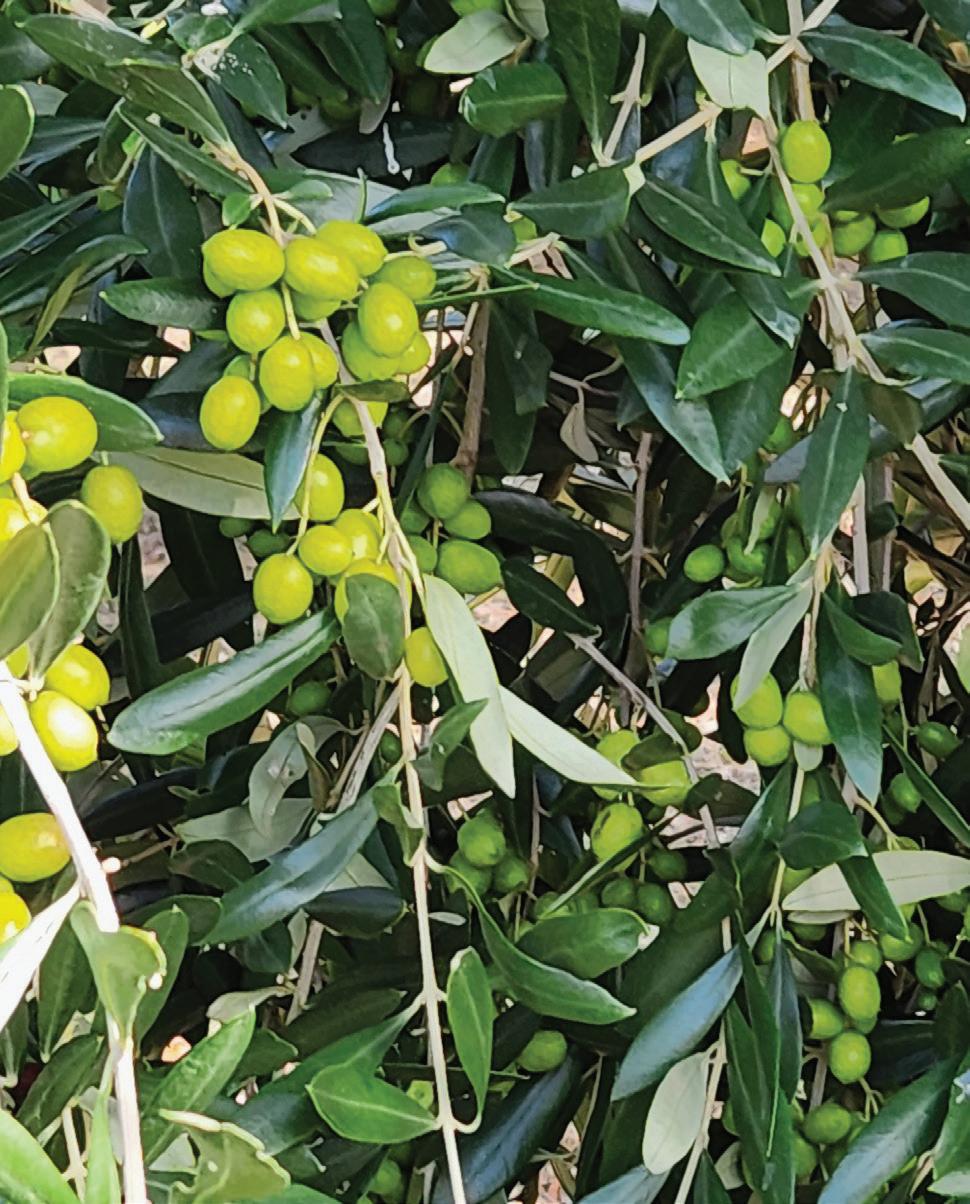
Diana explained that their extra virgin olive oil is obtained by processing the olives, within 24 hours of harvest, at under 24 degrees, so there's no change in the oil composition. Kapiti Olives' Olive Oil is sent to Australia for testing and certification, so it can carry the red olive mark that designates the oil as Extra Virgin Olive Oil (EVOO) and a product of New Zealand.
The awards Kapiti Olives has gained affirm the high quality of their extra virgin olive oil. Samples are sent for judging by a panel of New Zealand and overseas judges. Previously, Kapiti Olives also gained gold and silver medals in international competitions.
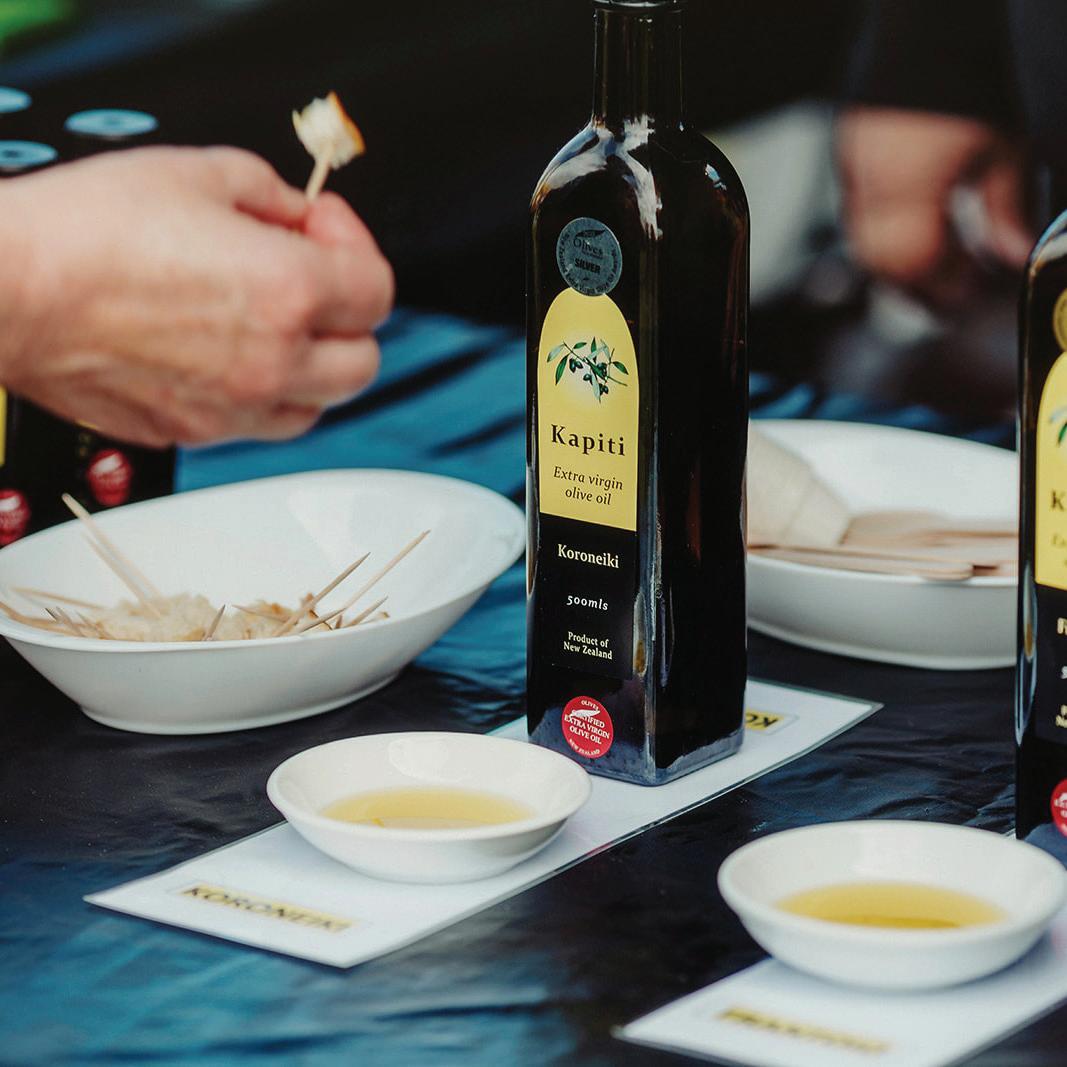
The pandemic positively impacted business as the public shopping from home increased sales from Kapiti Olives website. They can browse, shop and get it delivered to the door. Many of our buyers have carried on with this trend.
Kapiti Olives' Extra Virgin Olive Oil is sold in New Zealand. Foodstuffs is a significant buyer of the oil, along with other wholesalers. It also goes into local cafes, shops, and gift

boxes. The pair do not have a shop, and their physical presence is at selected markets such as the Kapiti Food Fair and the couple's local Saturday beach market in Paraparaumu. However, they also have an online shop through their website.


Educating the consumer is something Grant and Diana are passionate about.
Diana said that Extra Virgin Olive Oil's versatility was one of its strengths as it could be used to cook with, drizzle on family-favourite foods, add to soups, salad dressings, and in baking.
Diana and Grant's favourite way to enjoy their oil is with vanilla ice cream and fresh berries drizzled with their Leccino oil. It also has great anti-inflammatory properties and is an excellent source of antioxidants.
She continued that the pair will continue producing high-quality Extra Virgin Olive Oil. The plan moving forward is to keep pruning the trees to keep them rejuvenated and producing well should make this happen.
Koroneiki is the Crosse couple's favourite variety to grow. It is not as vigorous, keeps a good shape, and therefore only needs a little pruning. The Koroneiki oil is a favourite of the pair for dipping, drizzling, and cooking steak.
As a fresh New Zealand product, the pair stated that customers can 'taste the difference' with Kapiti Olive Oil.

JAN WHYTE & NIALL HOLLAND
Old French Road
Jan Whyte and Niall Holland are partners and owners of Old French Road, the New Zealand-based olive grove and oil company based in the Banks Peninsula.

Whyte had always envisioned the area as having great potential for olive growth.
When considering retirement from their long-term careers as general practitioners in Christchurch, the pair came across the opportunity to purchase the Old French Road, with decade-long established trees.
“We naively jumped in feet and all,” said Holland.
With a grove of 1,100 trees, 50 percent are Frantoia, a popular and more mildly flavoured oil, and the rest is a mixture of Kalamata, Manzanilla, Picholine, Uovo di Pigeoni, and Sevillano.
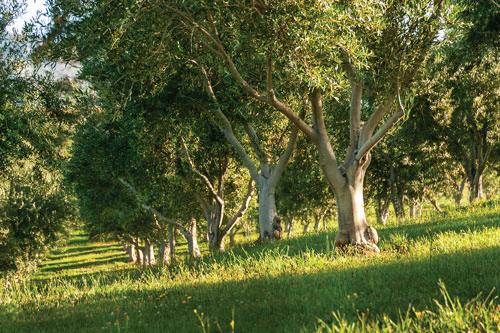

“As you might see, we have many table olive varieties and harvest these for table olives and oil.”
Whyte and Holland are in it for their shared love of high-quality oil rather than profit, with Holland adding that the pair are in the fortunate position to think this way. This is why
Old French Road oils are submitted for award ceremonies yearly. In the 12 harvests the pair have produced, they have earned approximately 50 awards, including best boutique oil and several gold medals.
The Old French Road sets an excellent example of controlling the whole process from hand harvesting to processing and packaging, as it has its press on site and does its bottling and packaging.
As a hillside planted grove, Whyte and Holland said that this makes harvesting more problematic as it is a winter harvest when the ground is liable and wet, with groves of similar size usually contracting harvesting and tree shakers, who would not be able to cope with Old French Road’s terrain. To reduce the risk of slippage on the steep slopes, the pair have planted native New Zealand trees.
“However, the hills and proximity to the sea
mean that we do not have to worry about crop loss due to frost as is a risk in much of Canterbury. It is also a marginal climate for oil production, which greatly enhances flavours.”

Under stress, trees (grapes and many other fruits) generally produce more complex and exciting flavours. Whyte and Holland detailed two intensive periods each year. The first is the harvest, which is done between late May and August, followed by pruning.
For the rest of the year, there is grove maintenance with periodic spraying to prevent fungal and to keep the grass down. At Old French Road, the grass is mowed as the pair prefers this aesthetic.
The most brutal harvest for Whyte and Holland was their second, where there was a combination of inadequate prior pruning, terrible weather and hungry birds, which led to minimal crop.
The best year coincided with the first year of Old French Road having its press, four harvests ago, which was a steep and rapid learning curve, which immediately followed the COVID-19 pandemic, which meant that the person who would usually demonstrate the operation of the press was no available to travel from Australia to teach Whyte and Holland, and to top it off, the instructions were all in Italian.
“There was a huge amount of fruit to be processed. You could say it was our best and worst year.”
The pandemic also drove a significant increase in sales for Old French Road, as people have opted
for locally crafted oil options.

As the environment has warmed and gotten wetter, Whyte and Holland said that the focus would be on controlling fungal disease, which puts heavy emphasis on pruning to very open trees. Contrary to this, warmer and sunnier climates will favour the pair, with increased oil percentages in olives.

Old French Road oils are sold at local Christchurch retail outlets, high-end restaurants, and sporadic amounts for overseas markets.
“Unfortunately, the high costs of freight tend to make this uneconomic. We have had an American buyer, with interests in New Zealand, who has delicatessens on the West Coast of the US take caseloads back as checked luggage. We have also had regular orders from Superyachts calling into New Zealand.”

With both Whyte and Holland in their 70s, the most significant challenge moving forward is making the business and practices as age compatible as possible. If the pair were to plant an olive grove, they would combine Frantoia and Nocellara, their favourite varieties.
Holland concluded that Canterbury and much of New Zealand produce olive oil of the highest standards by any international measure. The industry is a cottage one, and without the dedication of oil lovers such as Whyte and Holland, it will struggle to survive, which would be a great pity as it is an exceptional product, as gold medals in the New York Olive Oil Competition have repeatedly shown.

olivespotlight
HELEN MEEHAN OLIVO
Olivo is a small olive grove and oil business based in Martinborough. Helen Meehan manages the overall operations, crafting the infused oils, conducting in-store tastings, and carrying out the marketing and social media of the brand. John Meehan is the finance director, head of dispatch and the tasting room manager.
"We outsource some of our regular jobs such as spraying, pruning and pressing, bottling and labelling," said Helen.

Helen and John decided just over 20 years ago that they needed to do something different with their lives. John was a partner at PWC, and Helen worked as a senior executive for Telecom New Zealand in the IT space. Originally hailing from Manchester in the United Kingdom and having been in New Zealand for 20 years already at the time, John remained at PWC for another eight years as Helen worked to build up the business.
The pair were one of the first to make infused oil in New Zealand and have always been clear that they wanted to prove that Olive growing could be a fully commercial business, which has been the case since the business's second year.
The Meehan's aim is to create the best quality

olive oil, with the business brand values being boutique, artisan, and gorgeous, which Helen said her accountant husband said for gorgeous read profitable.
New Zealand's small market in the global olive oil industry has made it difficult to produce in bulk. Therefore, Meehan's focus is on quality. Helen said that one of Olivo's points of difference from other olive growers and brands was its suggestion that good olive oils can be used across the food range.
"We supply some of the top restaurants in NZ and have had medals just about every year since our first harvest in 2003."
The Meehan's also focus on providing top quality, responsive service and personally know their regular customers, which Helen added was, of course, not unique. Still, it is something that she said takes time and effort.
Helen explained that four key things can affect olive oil. Firstly, the type of olive. Just like grapes, Frantoio oil (Tuscan) tastes different to Koroneiki oil (Greek) or Barnea oil (Israeli).
Secondly, the time of picking olives. At Olivo, they pick the olives when they are a third green, a third black, and a third just changing, which usually produces mediumintensity oil.
Thirdly, the terroir.

"Like grapes, New Zealand olive oil is green and grassy and herbaceous because we grow our olives in grass pasture, and the taste is reflected in the oil."
Finally, weather. Hotter summers generally produce a more potent oil, and wetter summers produce milder oils as the olive is full of water that must be pressed out. The 2023

season has been a particularly challenging one for this reason.
The day-to-day life of an olive grower is everchanging, with Helen stating that every day can be different. One day Helen met an Italian olive grower who visited Olivo, started organising which oils Olivo would be available for 2023, and sent out food safety certificates. On another day, she will taste new oils, decide how and if Olivo will blend, and consider new infusions.

Olivo's best harvest was in 2021 when the brand won two gold medals and silver on international stages and harvested a good yield with substantial oil. This last season has been
the toughest, leading Helen to hope that the olives will be fine with hotter, dryer weather for the upcoming months, with enough rain, as too much is also not ideal.
The pandemic was some of the best years for the Olivo business as New Zealanders decided to travel their own country, leading them to places such as Martinborough, renowned as a wine village, and this led many to visit Olivo as well.

"People became more familiar with shopping online, particularly if they had visited us here." Olivo can be found in fine food stores across the country. Some of the brand's oils are exported to Singapore and found in one of the country's top fine food stores, Little Farms.
For the future, the Meehan's will continue to focus on absolute top quality. Olivo produces nine different infusions, which is enough when a producer wants the quality to come through.
"I am having fun playing around with our new lavender-infused olive oil, enabling me to market it with food."
Helen has a soft spot for Barnea Olive because it's what she learned on and off the infused range; she loves Olivo's porcini oil because it was her first infusion.
Adding valuable tips for those looking and wondering what olive oil can be used for other than a drizzle on salad, Helen said that the oils were perfect over soups, cooking fillet steaks and an excellent dairy-free, vegan and vegetarian ingredient.
"It is lovely in cakes because it keeps them moist and lasts longer. That is before we start on its health properties. Extra virgin olive oil is one of the bases of the Mediterranean Diet, often touted as one of the best diets in the world."
olivespotlight


Owner and managing director of Telegraph Hill, Geoff Crawford, worked in Wellington in the early 2000s in the global sales department of a large company. The company relocated to Auckland and offered redundancy to anyone who didn’t want to go. This resulted in Crawford realising that this would be his opportunity if he were ever to run his own business.

aised loving olives, Crawford was often disappointed by the supermarket quality of olives available. He began researching options for import and distribution to retailers when he met a New Zealand-based olive grower looking for a business partner.

“Soon after, we set up Telegraph Hill. My business partner was in charge of growing and production, I was sales and marketing,” said Crawford.
Seven years later, Crawford bought out his business partner and took full ownership of the business, finally becoming a grower.
Telegraph Hill olives are naturally processed, where natural fermentation on the olives is conducted after harvest. This produces a beautiful-tasting olive after six to eight months of fermenting. This process can be sped up by using chemicals. However, Crawford added that this leads to different flavour development.
“As a vertically integrated business, we can control the inputs over fermentation and final packaging to deliver premium quality olives to market with the flavour profile we like to eat. Too many olives are super salty and super acidic. These are the signs of a mass market olive.”
Telegraph Hill operates an honesty belief system, where sharing growing knowledge benefits all growers helping this sector become more efficient and profitable.
As a new industry in New Zealand, sharing growing
knowledge and learning is the best way to keep trees healthy and increase yields for all growers.
OlivesNZ, the category’s industry body, has completed a six yeargrowing project to increase fruit yield per tree. This has been achieved through grants from Sustainable Farming Funds and MPI. This has resulted in a best practice model with the IP held by OlivesNZ and shared with all its members. This is the model Telegraph Hill uses to grow its olives.
Crawford explained that Telegraph Hill has a contract with growers in Hawke’s Bay and Wairarapa who follow this program, giving them consistent crops year after year.
As a small business, Crawford oversees everything, with hands-on growing work in the olive grove as necessary.
“Often days are split with some hours in the groves and office, where I fill an operational and marketing role.”
Crawford’s most memorable harvest was in 2020 during the country-wide lockdown, where Crawford caught covid on the last day of processing, so he was greatly relieved that it didn’t interfere with harvest.
“I’ve learned over the years that ‘olives are ready when they are ready’ delaying harvest has quality implications.”
As a grower based in Hawkes Bay, Crawford is deeply concerned with the environmental changes that have impacted the region, the severe rainfall and the disruption the area has faced because of extreme weather conditions.
“This year, we have had over the average annual rainfall in the first


six months. This rots crops, stops access, slows ripening, and reduces yields.”
Telegraph Hill is sold through supermarkets and independent retailers all over New Zealand. Its distinctive red packaging can be seen in stores nationwide. Some olive oil is also exported, with drizzle products being trendy in Japan.

The constant development of new products to have an increased portfolio of premium quality products will inspire Telegraph Hill’s customers. Currently, the brand is working with its growers on increasing yields per tree so that Telegraph Hill gets a better olive and the grower gets a better return.
Crawford’s favourite olive is kalamata, and in his grove, he also has a favourite tree for the yield it produces and its general aesthetic appearance.






























